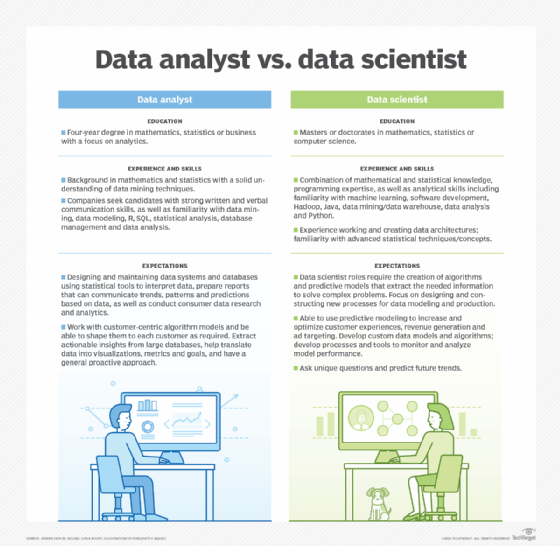Data scientist vs. data analyst: Comparing the 2 data roles
The differences can be subtle, but in general, a data scientist has more responsibilities and a more advanced background than analyst counterparts.

Being able to gather data, analyze it and predict trends has become an essential part of operations for organizations. It is important to make sure your company has the right tools and employees with the right skills.
Data analysts and data scientists can be game changers for companies new to the analytics and data management game. Their advanced skills and abilities can help provide deep insights, but judging which one makes more sense for your company can be difficult.
Data analysts and data scientists are often talked about, but deciphering the differences between the two can be a challenge.
Why does the difference matter?
It's not uncommon for data positions to be lumped into one title and for organizations to expect a data science unicorn to perform duties that fall under the data umbrella. But the truth is that members of the data team bring different skills to the table.
While data scientists and data analysts are both often necessary, knowing they are not the same can assist organizations in many ways, from recruitment to retention. Advertising a position under the label of data analyst that requires data scientist skills will find your organization far fewer candidates.
Additionally, knowing the differences between a data scientist vs. data analyst and recruiting for the proper role will make sure you retain the proper talent for the position you need filled. A data scientist being asked to perform the duties of a data analyst won't stick around for long, which can lead to delays and other headaches no organization wants.
Do they overlap?
One of the reasons it can be difficult to differentiate between a data scientist vs. data analyst is that some of their duties overlap. Both need to be well versed in mathematics and statistics, as well as certain programming languages to be able to do their jobs well.
It's also an important part of the job for both data scientists and data analysts to be able to communicate data insights to a business audience, meaning data storytelling and visualization are important skills to both positions. But the differences lie in what questions the data they're handling will answer.
Data analysts are often closer to the day-to-day business. They will work with algorithms and models that focus on specific business issue or have a customer focus. Data scientists focus more on the big picture. They deal with the future business prospects and build models that will help steer the business with insights for the long term rather than the short term.